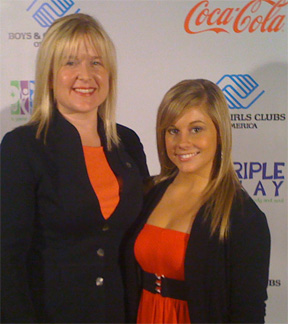
September 23rd, 2009 by admin in Better Health Network, Health Tips, News, Opinion
Tags: Diet and Exercise, NEJM, Obesity, Pediatrics, Primary Care, Soft Drinks, Tax
1 Comment »


This week’s New England Journal of Medicine contained a very, very interesting proposal put forth by a few prominent physicians and researchers working on the obesity crisis in America.
They propose that beverages loaded with sugar should be considered a public health hazard (much like cigarettes) and should be taxes. The proposal calls for an excise tax of “a penny an ounce” for beverages like sugar sweetened soft drinks that have added sugars. They cite research that links obesity to heart disease, diabetes, cancers, and other health problems. They say sugar sweetened beverages should be taxed in order to curb consumption and help pay for the increasing health care costs of obesity.
They estimate that the tax would generate about $14.9 billion in the first year alone and would increase prices of soft drinks by about 15-20%. That is big money, but at what cost?
My personal opinion is that while the tax would generate a lot of money that could be put to good use on anti-obesity programs, it is singling out one industry when obesity has numerous contributing factors. Calories Americans are getting from beverages have actually gone down in the past decade, but obesity rates still climb. Soft drinks alone are not making us fatter.
Americans need to pay closer attention to portion sizes and overall calories coming into their bodies from all sources. We know that Americans also eat too much fried food, candy, ice cream, etc. Should we tax everything that is “bad” for us? Absolutely not! And these foods are not “bad” when consumed in reasonable quantities in reasonable frequency.
We also need to learn how to move our bodies more to burn off some of the sweet treats that we love to indulge in. Weight loss is a simple equation that I don’t get tired of explaining again and again: Move more and eat less.
Taxing soft drinks will not decrease heart disease risk…exercising more and losing body fat by consuming less calories definitely will!
This post, Will Taxing Soft Drinks Solve The Obesity Problem?, was originally published on
Healthine.com by Brian Westphal.
September 20th, 2009 by Nancy Brown, Ph.D. in Better Health Network, News
Tags: Parenting, Pediatrics, Premature Death, Psychiatry, Psychology, Risky Behavior, teens
No Comments »

There was a very interesting article in Reuters Health in June that has stayed with me all summer, and I finally decided to share it with my readers – in hopes that writing about it will help me quit thinking about it!
The data for this study came from more than 20,000 teens involved in the 1995 – 2002 National Longitudinal Study of Adolescent Health, a nationally representative school-based survey done with students in 7th through 12th grades.
The results from this disturbing study suggested that about 15% of teens believed they were likely to die prematurely, which predicted increased involvement in risky behavior and poor health outcomes during young adulthood. The question apparently asks if teens think there is at least a 50/50 chance that they will die before the age of 35, and the students who believed they would die prematurely were more likely to report illicit drug use, suicide attempts, fight-related injuries, police arrests, unsafe sexual activity, and a diagnosis of HIV at subsequent data collection points.
I guess I am not sure what to do with this information. On one hand, it suggests that all of the adults in teenagers’ lives – parents, teachers, coaches, doctors, neighbors, and family members – should pay attention to what teens think about premature death, calling for more communication, which I am supportive of, but how exactly would this subject come up?
I do not think asking how long they expect to live is the answer, but instead I do believe that adults can focus more on staying connected with teens and promoting optimism and hope in youth. I do not believe this means not talking about youth in meetings, but actually spending time with those youth where they spend their time, teaching them skills, sharing a sense of accomplishment, and making a physical and meaningful connection with each of them. Every teen needs to have multiple adults they can talk to and spend time with, especially during times of stress or interpersonal conflict.
Listening to teens talk about their friends, their futures, and their insecurities is a window into their expected life course, and being present enough to hear comments reflecting a “why bother” attitude may be the key! Please listen to your teens and help them feel positive about themselves today!
This post, Many Teens Believe They’ll Die Prematurely, was originally published on
Healthine.com by Nancy Brown, Ph.D..
September 20th, 2009 by Medgadget in Better Health Network, News
Tags: Automated, Blood Draw, Bloodbot, Phlebotomy, Robot, Technology, Vein
No Comments »


Here is a project from the folks at the Department of Mechanical Engineering at Imperial College London, and its Mechatronics in Medicine Laboratory, who are bent on developing an “active robot designed to take blood samples from the ante-cubital fossa…”
The Bloodbot identifies the location of a suitable vein by pressing a probe against the surface tissue of the ante-cubital fossa and measuring the force on the probe. The difference in the characteristics of the tissue from its surroundings, in response to the applied force, indicates the presence of a vein.
Once a suitable vein has been found, it inserts a needle under force control. When the needle penetrates the vein (identified by its force/position profile), the control system prevents further insertion, thus avoiding overshooting the vein.
We think they need to combine this robot with VeinViewer for a more accurate, and probably spookier, experience.
The Bloodbot Project…
Flashbacks: VeinViewer Shipped!; First Hospital To Use The VeinViewer ; Video of VeinViewer; VeinViewer Off to Europe; Vein Contrast Enhancer
(hat tip: DVICE)
*This blog post was originally published at Medgadget*
September 17th, 2009 by Dr. Val Jones in Announcements, News
Tags: BGCA, Boys And Girls Clubs Of America, Childhood Obesity, Chris Spain, Coca Cola, Dominique Dawes, Judith Pickens, Shawn Johnson, Stacey Walker, Tenley Albright, Triple Play
No Comments »

Dr. Val & Olympic Gymnast Shawn Johnson
Because of obesity, this generation of children may be the first in US history to have a shorter lifespan than their parents. The CDC reports that teen obesity rates are growing exponentially, having tripled in the past 20 years. We also know that 70% of obese children become obese adults, and that 75% of our healthcare dollars are spent on chronic disease management – diseases that are 80% preventable with lifestyle modifications. Efforts to curb healthcare costs are unlikely to succeed without addressing America’s obesity epidemic.
So who is addressing the obesity crisis now? One shining example is the Boys & Girls Clubs of America (BGCA). They recognized the impact of obesity on their club members and looked for ways to increase physical activity levels, encourage healthy eating, and repair self esteem in America’s underprivileged youth. After consulting with the Department of Health and Human Services (and obtaining funding from the Coca-Cola company), the BGCA created a multi-faceted initiative, called Triple Play, to combat overweight and obesity. The results are very encouraging.
After 2 years, an analysis of over 2,250 club members suggests that 90% of youth enrolled in the program met the daily, federal physical activity recommendations while a significant number improved their nutritional status, choosing to eat significantly more fruits and vegetables. Perhaps most interestingly, the participants also scored higher on tests of “self-mastery” which are correlated with self esteem and social skills. Overall, girls were impacted more strongly by the program than boys, though the reason for this is unclear.
I had the honor of moderating a panel of experts who discussed the impact of Triple Play on BGCA members. In attendance were Olympic gold medalists Shawn Johnson, Dominique Dawes, and Dr. Tenley Albright in addition to SVP of BGCA, Judith Pickens, former Club kid and Youth of the Year, Stacey Walker, and Chris Spain from the President’s Council on Physical Fitness and Sports. It was heartening to see that there are programs that can bend the obesity curve – because success in this area of disease prevention has been hard to come by.
I hope that healthcare reformers will carefully consider the impact of obesity-driven chronic disease, and look to program success stories like Triple Play as a means to affect long-term improvements of America’s health. Our kids’ lives and the future productivity of our country are dependent upon the implementation of prevention programs that work. Cheers to BGCA for leading the charge against childhood obesity!
September 15th, 2009 by Dr. Val Jones in Announcements, News
Tags: Be Healthy, BGCA, Boys And Girls Clubs Of America, Carolina Correa, Diet and Exercise, Dominique Dawes, Obesity, Pediatrics, Steny Hoyer, Triple Play
No Comments »

Rep. Steny Hoyer & Dr. Val
House Majority Leader Steny H. Hoyer offered the keynote speech at the Youth of the Year awards for the Boys & Girls Clubs of America (BGCA). Rep. Hoyer was himself a member of the club in his late teens, and credits it for turning his life around and setting him up for career success.
Rep. Hoyer reminded the audience about how critical it is for young Americans to have positive role models, a safe place to socialize, and adults who believe in them. The BGCA is also involved in reducing and preventing childhood obesity – a national crisis of great medical importance.

Carolina Correa & Dr. Val
Young Carolina Correa, the 2009 Northeast Region Youth of the Year, introduced herself to me at the event. She was bright and confident – and it was only during her speech to the crowd that I discovered that she had survived a triple family homicide in Colombia, moved to the US with her mom and ailing step dad, and worked as a child laborer to provide for her family and younger brother. Thanks to the Boys & Girls Clubs, she managed to overcome all her obstacles and find peace in the midst of her personal storm, achieving academic and athletic excellence in the process.

Dominique Dawes & Dr. Val
Olympic gymnast Dominique Dawes is a strong supporter of the BGCA – and helps to inspire young members to get fit and pursue athletic careers.
Tomorrow I’ll be moderating the Be Healthy event on behalf of the BGCA. A panel of experts will be revealing promising new research results – demonstrating how BGCA’s Triple Play program has dramatically reduced obesity rates among those who enroll in the program.
With 70% of obese children becoming obese adults, and obesity itself costing at least 10% of all healthcare spending – any program that bends the obesity curve is welcome news. So stay tuned for more coverage on BGCA’s approach to helping kids get fit – and developing lifelong character in the process.
I myself am humbled to spend time with youth (like Carolina) of such character and perseverance. They are truly inspirational.



















